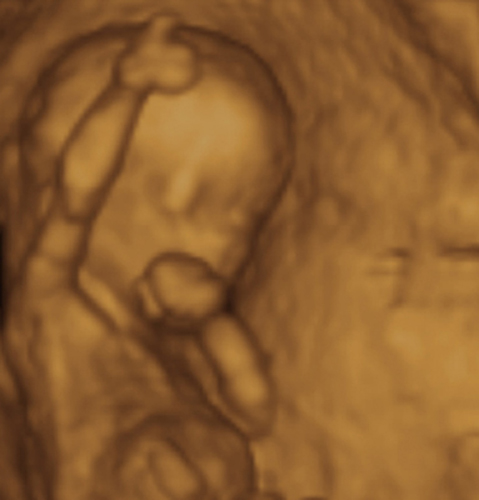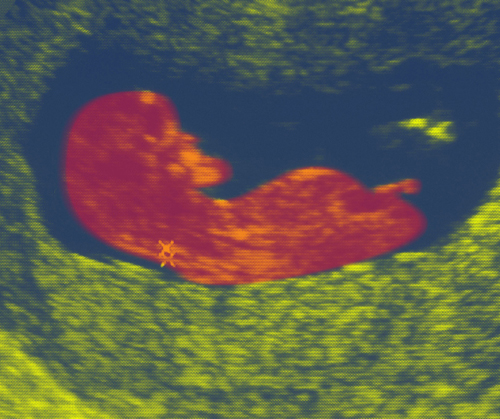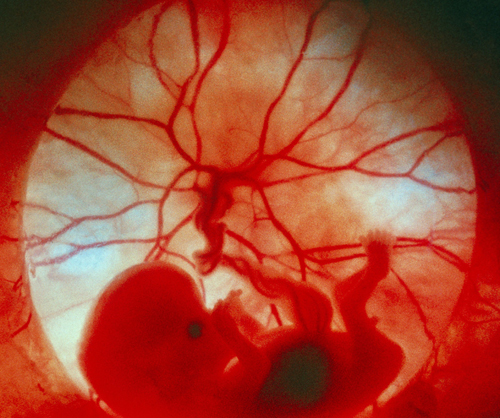You are 13 Weeks and 5 Days 184 days to go…
It’s only a minor pregnancy symptom, but nasal congestion can happen most days—and make you a snorer at night!
Your baby today
At this stage the head, although still large, has a much more
rounded shape than before and, as the jaw and neck lengthen, the chin
moves away from the neck. An ultrasound now will show the thumb as
distinct from the fingers.

Is your partner nudging you in the night because you’re keeping him awake?
It’s common for pregnant women to snore. This is largely due to
increased swelling of the nasal passages, but it can also be caused by
increased weight and the fact that you may roll over onto your back
during the night.
Your stuffy nose is due to
the increased volume of blood in your body while you’re pregnant. This
can cause congestion and make your ears feel blocked, too. Nosebleeds
are also very common in pregnancy; some women find that every time they
blow their nose they have a small amount of bleeding. This is because
the blood vessels in the nose are very fragile, and with the increased
volume of blood flowing through them, they tend to bleed more easily.
However, the bleeding should be very light.
To treat a nosebleed,
tip your head forward and pinch the middle of your nose (in the soft
part) hard. It should stop quickly. If it doesn’t, try an icepack on the
nose to help the blood vessels constrict. In the rare situation of
heavy bleeding, go to the hospital. Seek medical advice if you are
getting heavy bleeding regularly.
… Nutritionist
| Q: |
Is it safe to eat peanuts or foods containing them during pregnancy?
|
| A: |
Some experts feel that if a child is at a particular risk of
developing a peanut allergy, the problem may have started to develop
before birth. Due to the mother’s diet, a sensitivity to peanuts may
have begun when the baby was exposed to them in the uterus.
However,
recent studies have suggested that avoiding peanuts during pregnancy may
be increasing the incidence of allergies, pinpointing countries where
peanuts are a staple food and allergies relatively rare. Although
studies have been inconclusive, your baby may be at risk of developing a
peanut allergy if you, or your partner, or your baby’s siblings suffer
from asthma, eczema, hay fever, or other allergies. If any of these
apply to you, ask your doctor whether you should eat peanuts during your
pregnancy or while you are breast-feeding.
There is no need for you to avoid eating peanuts if your baby is not at risk of peanut allergy.
|
… Dads
Looking forward
During the first trimester,
you probably anxiously awaited developments in the pregnancy and
supported your partner when the going got tough. Now that her early
pregnancy symptoms, such as nausea and sickness and fatigue, are likely
to have passed, and the risk of miscarriage is reduced, you may begin to
feel differently about the pregnancy and your future.
As your partner
starts to show increasing strength and vigor, and as you begin to notice
her changing body shape and small belly, you may find that the reality
of the pregnancy hits you and your sense of trepidation is replaced by
optimism as you both look forward.

You are 13 Weeks and 6 Days 183 days to go…
Your baby is growing and getting stronger every day, and it’s all thanks to her life support system—the placenta.
Your baby today
In this color ultrasound image the baby is red and the placenta
green. It is just possible to see the two crosses that measure the depth
of fluid in the nuchal fold at the back of the neck . Now is the last opportunity to measure this reliably.

Your baby’s rapid growth
continues and she’ll nearly double in size from 2.25 in (5.5 cm) to 4
in (10 cm) during the next three weeks. Muscle and bone growth advances,
but, although all joints are present, it will be three weeks before the
skeleton begins to harden.
Your baby is
now totally dependent on the placenta for her nourishment. Environmental
factors have almost no influence on your baby’s size at this stage; all
babies up until around 20 weeks’ gestation are the same size.
The placenta is
larger than your baby and supplies all the nutrients she needs. To aid
her growth, the placenta extracts amino acids from your circulation,
giving her high levels. Amino acids are the building blocks of protein,
from which muscles and organs develop.
The umbilical cord
can be seen connecting this 13-week-old fetus with the placenta, which
nourishes your baby. The incredible blood vessels of the placenta are
clearly visible in the background.

… Nutrition
Protein plus
Protein is required for the development of the baby and placenta, as well as to fuel changes taking place in your body .
The protein requirement for pregnancy is 6 or 6.5 oz daily, instead of
the usual 5 or 5.5 oz. Include a source in all three meals daily.
Protein sources include meat, poultry, fish, milk, cheese, beans, nuts,
and seeds.
The best protein foods
are those that are lower in saturated fat and cholesterol. Trim the fat
off meat and eat one or two servings of fish
or seafood. When choosing dairy products, pick skim milk and low-fat
cheeses. These retain all the protein benefits of the whole milk
versions. Nuts and seeds are rich in heart-healthy oils. Vegetarians
need to eat a wide range of plant proteins to ensure they are getting
adequate amino acids.